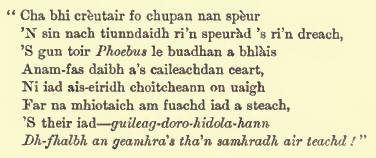Conscious at
last that pouting and inordinate weeping became him not, and that, being
constantly on the "rampage," like Mrs. Joe Gargery, was hardly
consistent with his place in the calendar, April [1869] betimes resolved
to "tak a thocht and mend," and now, like Richard, is himself again—all
sunshine and smiles. The rain-gauge, to be sure, with stern
impartiality, will still show an occasional " inch," or parts of an
inch, if you are very particular in your inquiries, when examined of a
morning, but its readings now at least are in no way appalling, for they
represent the warm and genial rainfall of April showers, that, after
all, are as necessary on the west coast at this moment, and as
refreshing to the soil, as the orthodox cup of mulled port of an evening
was believed to be to the weary traveller in the good old days of
stage-coaches and post-chaises. The country, at all events, is looking
very beautiful just now, everything so green and glad, so fresh and
fair, and full of promise of a yet gladder, and gayer, and brighter day
at hand, when the swallow, twittering, shall dart, a glossy meteor, in
the sunlight, and the cuckoo shall challenge the truant schoolboy to
repeat its well-known notes, correctly if he can. Now is the time to
hear our native song-birds at their best, warbling their sweetest
strains, and to decide, once for all, if it be possible, which you like
best; the loud, clear, silvery tinkle of the seed-shelling fmch's rich
and rapid song; the liquid and mellifluous warblings of the soft-billed
tribes; or the soul-entrancing, round, rich, flute-like piping of the
throstle, song-thrush, and merle. How it may fare with the reader who
trios to decide the point we cannot say. For our own part, no decision
that we could ever arrive at could keep its legs for two days together.
No sooneT did
we decide that the skylark and its congeners had the "best of it, than
the goldfinch, with a score of lively cousins to aid and abet,
challenged the verdict, and forced us to acknowledge Ida exquisite
mastery in song—an admission made, however, only to he retracted again
almost as soon as made, for in our walk on the evening of that self-same
day did wrc not stand, and for the life of us couldn't help
standing—breathless, and hushed, and still—to listen to the merle and
song-thrush from the neighbouring copse pouring forth the indescribable
riches of their God-taught vespers as the sun went down; and did we not,
then and there, vow, in utter forgetfulness of finch and skylark; that
no music of earth could for a moment compare, in execution and compass,
in distinctness, and cheeriness, and purity of note, with these
matchless twilight strains! The truth is that no music is equal to
bird-music—wild-bird music, that is—in its season, and amid all its
natural surroundings; and the probability is that we shall give the
preference at any time to the melody of one bird over that of another,
not on any well-defined principles of choice or selection in the matter,
but simply in accordance with our own prevailing mood and temperament of
the moment. Such, at least, has been our own experience ; but the reader
has every opportunity at this season of studying the question for
himself and deciding. Except that of the nightingale, perhaps the music
of no bird has attracted so much attention by its beauty and
suggestiveness as the merry trill of the skylark's ascending song. The
poets of every country in which it is to be found have vied with each
other in their praises of the only bird that sings as he soars, and
soars as he sings, selling on quivering pinions the aerial terraces of
heaven, until he can scarcely be discerned, a music-showering speck
against the back-ground of the blue profound ! The other day we fell in
with some curious verses by the French poet Du Bartas, in which he
strives, and not altogether unsuccessfully, to imitate the merry trill
and rhythm of the skylark's song :—

The last line, if rapidly repeated with the proper beat
and intonation, will be found a really very successful imitation of the
concluding notes of the lark's well-known song. Many of our readers will
remember that the North Uist bard, Ian Mac Codrum, in his Smeorach
Chlann-Domhnuill, manages
very happily to imitate the smeorach or
song-thrusli's notes in the burden or chorus ; while Alexander
Macdonald—Mac Mhaighstir Alasdair—very naturally falls, like the French
poet, into an imitation of the wild-bird music of the woods and groves
in a stanza that may be quoted not inappropriately at this season :—

The lines of Du Bartas have little meaning in themselves,
and are untranslatable, being simply an attempt on the poet's part, in
some odd moment of hilarity and abandon, to
embody the notes of the skylark's song in something like articulate
verse. The general sense of Macdonald's lines describing the
irrepressible inclination of all living creatures to be jubilant and
joyous at the return of spring, cannot better be rendered than in the
first part of Scott's introductory stanza to the second canto of the Lady
of the Lake, only
that the return of spring in the one case, instead of the return of morn
in the other, prompts to the outburst of gladness and song :—
''At morn the black-cock trims his jetty wing,
'Tis morning prompts the linnet's blithest lay,
All Nature's children feel the matin spring
Of life reviving, with reviving day;
And while yon little bark glides down the bay,
Wafting the stranger on his way again,
Morn's genial influence roused a minstrel grey,
And sweetly o'er the lake was heard thy strain,
Mixed with the sounding harp, O white-hair'd Allan-bane!"

